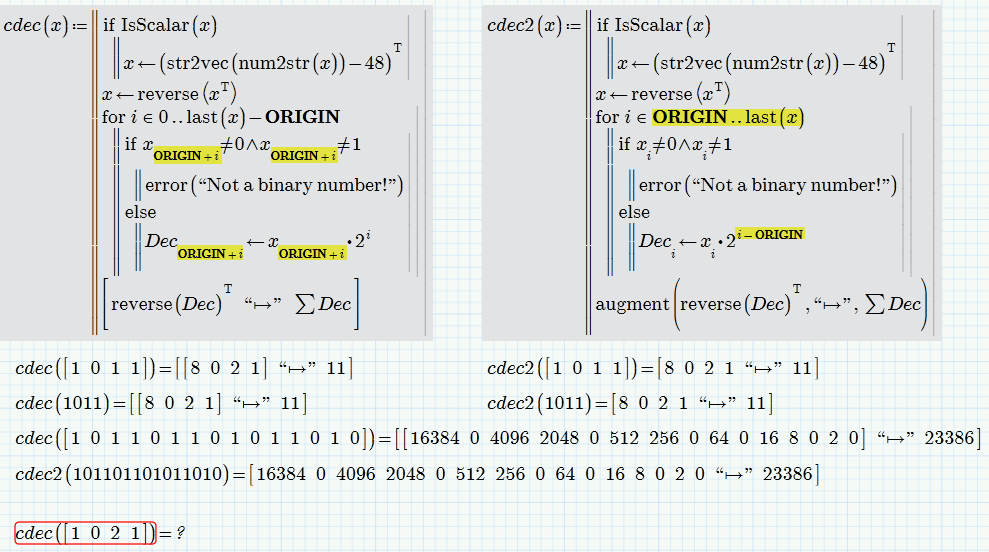Community Tip - Visit the PTCooler (the community lounge) to get to know your fellow community members and check out some of Dale's Friday Humor posts! X
- Subscribe to RSS Feed
- Mark Topic as New
- Mark Topic as Read
- Float this Topic for Current User
- Bookmark
- Subscribe
- Mute
- Printer Friendly Page
How to convert from binary number (vector form) to decimal (with Prime)?
- Mark as New
- Bookmark
- Subscribe
- Mute
- Subscribe to RSS Feed
- Permalink
- Notify Moderator
How to convert from binary number (vector form) to decimal (with Prime)?
Greetings.
I need convert binary numbers and show the process, for example:
The binary 1011 is the matrix vector [1 0 1 1], need a program that make 2^3, 0^2, 2^1 and 2^0 then show a matrix [8 0 2 1] and later the sum 11 (8+2+1).
Need show the matrix and sum, working according to the number of digits.
Also need convert (based on block of 3 and 4 digits of) binary number to octal and hexa numbers.
Solved! Go to Solution.
Accepted Solutions
- Mark as New
- Bookmark
- Subscribe
- Mute
- Subscribe to RSS Feed
- Permalink
- Notify Moderator
Valery Ochkov wrote:
Sorry.
for i=ORIGIN to last(x) - ORIGIN
NO! Definitely not. That would be one or more too few, if ORIGIN>0.
But thanks, because you are right, that I made a mistake in this respect ( I should have tried using a value for ORIGIN different to 0).
We can correct it in different way. I guess the way I have chosen in cdec2 is the better one:

As a bonus I added the ability to provide the argument either as a row vector OR as a simple scalar.
Werner
- Mark as New
- Bookmark
- Subscribe
- Mute
- Subscribe to RSS Feed
- Permalink
- Notify Moderator
The problem is, that when you use the column-selector, you get a 1x1 matrix, bot a scalar.
You can't compare a 1x1 matrix to a scalar like 1 or 0.
Use something like x[0,i instead.
Furthermore you program has no return value and the while loop will rund endless, as i never changes inside that loop.
Not clear what you try to do with x[i]<--x[i] in that "try and catch".
WE
- Mark as New
- Bookmark
- Subscribe
- Mute
- Subscribe to RSS Feed
- Permalink
- Notify Moderator
May be so?

- Mark as New
- Bookmark
- Subscribe
- Mute
- Subscribe to RSS Feed
- Permalink
- Notify Moderator
Looks like you also want to see the powers of 2 as intermediate result and you also tried to implement some error handling.
Maybe you were looking for something like this:

- Mark as New
- Bookmark
- Subscribe
- Mute
- Subscribe to RSS Feed
- Permalink
- Notify Moderator
Sorry.
for i=ORIGIN to last(x) - ORIGIN
- Mark as New
- Bookmark
- Subscribe
- Mute
- Subscribe to RSS Feed
- Permalink
- Notify Moderator
Valery Ochkov wrote:
Sorry.
for i=ORIGIN to last(x) - ORIGIN
NO! Definitely not. That would be one or more too few, if ORIGIN>0.
But thanks, because you are right, that I made a mistake in this respect ( I should have tried using a value for ORIGIN different to 0).
We can correct it in different way. I guess the way I have chosen in cdec2 is the better one:

As a bonus I added the ability to provide the argument either as a row vector OR as a simple scalar.
Werner
- Mark as New
- Bookmark
- Subscribe
- Mute
- Subscribe to RSS Feed
- Permalink
- Notify Moderator
- Mark as New
- Bookmark
- Subscribe
- Mute
- Subscribe to RSS Feed
- Permalink
- Notify Moderator
rking-2 wrote:
I need convert binary numbers and show the process, for example:
The binary 1011 is the matrix vector [1 0 1 1], need a program that make 2^3, 0^2, 2^1 and 2^0 then show a matrix [8 0 2 1] and later the sum 11 (8+2+1).
Need show the matrix and sum, working according to the number of digits.
Also need convert (based on block of 3 and 4 digits of) binary number to octal and hexa numbers.
Here's another approach to the conversion from a binary digits vector to a vector of powers and sum - works with any base, not just binary ...






